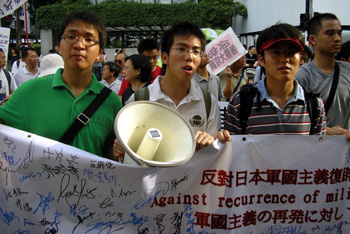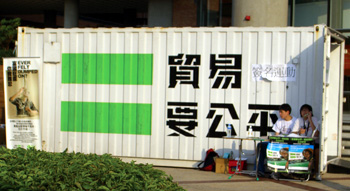Our Community
Other Stories

Courtesy of Baptist University's student union
Fervent student unions face icy majority
by Kit Lou
The gap between university students and their constituencies is widening. Many students see their unions' work should be focused on getting them shopping discounts or photocopying services, rather than trumping social injustice.
Yet, compelled by a mission to take part in social issues, leaders of student unions consider that they have to raise the awareness of fellow students. They say sometimes they need to react promptly towards current affairs, though without consulting their electorates.
Many students, in fact, have no idea about what their student unions do for them; some are even sceptical towards the unions' social actions. “They go to rallies because they want to be the focus in society. Just a few of them really concern the development of society,” claimed Dennis Chan Kin-ho, a first-year finance student at the Hong Kong Baptist University .
Other students do not want their unions to speak for them. Chung Tsz-kin, a third-year physics student at the Chinese University of Hong Kong , said he would not do anything even if he knew their actions in advance. “I believe most of the students also think so,” said Mr Chung, who does not know the student leaders in person.
Ivan Choy Chi-keung, a senior instructor of government and public administration at the Chinese University, pointed out that the alienation between student unions and students became more serious as the enthusiasm of most students towards social issues had “cooled down''.
Mr Choy, a former student leader, also said the emergence of political parties replaced the leading role of student unions in social campaigns since the 1980s.
The student unions are aware of students' apathy towards politics and social issues.
The president of the Baptist University 's student union, Pun Lung-hoi, said his group could only mobilise about 10 students to join the June 4 pro-democracy rally in 2004. The Chinese University student union got a similar response.
“University students in the past could bring impact to local politics. They would tend to participate more as they believed they had the power. But students nowadays feel helpless in local politics. For example, they may feel the fight for universal suffrage is a vain attempt,” Mr Pun said.
To rejuvenate students' awareness in social issues, the Baptist University 's student union makes use of social welfare appeal to encourage students to respond to social and student issues. Mr Pun said it was important to attract students to have their “first contact” on those issues.
For example, students got gift coupons for filling out questionnaires about using English as medium of instruction in November. The response rate was nearly 10 per cent of all the students.
Not every student union finds strategies to deal with the alienation of students. The Chinese University 's student union does not consider the problem serious.
The union's leader, Wong Hon-pong, said even though students learned about their proposed actions, they might not be showing their support.
Under the democratic elections in universities, in nominal terms, student unions are given the mandate to represent students as every student can cast a vote. However, fewer students are willing to take part in the elections in recent years.
Mr Pun pointed out that many student unions did not have enough candidates to form a cabinet to stand for election, such as the Baptist University 's student union of the academic year 2000-01.
Students who run the posts now do not feel as proud of their positions as those student leaders did in the past, he said.
Fellow students, meanwhile, complained that the student unions did not do enough to inform them about their actions.
“I don't know what they are doing most of the time until I see some comments on the message board after the events are over,” said Yip Shu-tong, a fourth-year electronic and information engineering student at the Hong Kong Polytechnic University.
The student unions often send mass e-mails to inform students of their actions. Mr Wong sees it effective since students often check their mailboxes. Other methods like delivering handbills, putting up posters and banners can also help.
But sometimes when they have to react quickly to urgent issues and breaking news, they can only tell the students about their actions after they are over, he said.
Mr Pun from the Baptist University 's student union agreed on the difficulty in informing students in time.
“(For example) The Civil Human Rights Front organised a demonstration at the Legislative Council, but it only informed us a day before it went. It's not possible for us to tell all the students in such a short period of time, still we joined the demonstration in the end.”
Student unions often join their hands together to form a collective opinion on social issues. Their umbrella group, the Hong Kong Federation of Students, has been keeping a close eye on social injustice.
The organisation was widely known at the height of public protests after Beijing 's military crackdown on the democracy movement in mainland China in 1989.
The federation member from the Baptist University , Erikson Chan Ka-chun, said student leaders should voice out against unfair issues. For example, the federation is very concerned with the widening income gap in Hong Kong . It is also paying close attention to education reforms.
While student leaders actively participate in social issues, some students want their student unions to fight for their welfare instead, such as shopping discounts and photocopying services.
“A student union must fight welfare for us,” said Keith Mui Yiu-kei, a first-year student of cultural and religious studies at the Chinese University .
The president of the Polytechnic University 's student union, Thomas Yeung Ka-kui, agrees that student unions should provide services like selling stationeries to their students. But he also stresses on their leading role in arousing students' awareness of social issues.
One of the issues is anti-globalisation. The fair trade issue is especially hot because of the World Trade Organisation's ministerial meeting in Hong Kong in December.
Unlike past indifference towards social issues, the Polytechnic University students showed support to their student union's signature campaign on fair trade, which was co-organised by Oxfam Hong Kong. About 1,000 signatures, one-tenth of the student population at the university, were collected.
Mr Yeung said the campaign was to facilitate the discussion among students about fair trade and globalisation. He said that student unions should not try to impose their stance on to students.
Rather than merely focusing on the issue itself, some students at the Chinese University were more concerned about the way that student unions would express their viewpoints during the conference.
“I will support them if their action is a rational one like the collecting of signatures. But I don't want to see anything radical happen, like storming the conference venue,” said Mr Mui, who wants his student union to fight for the students' welfare.
